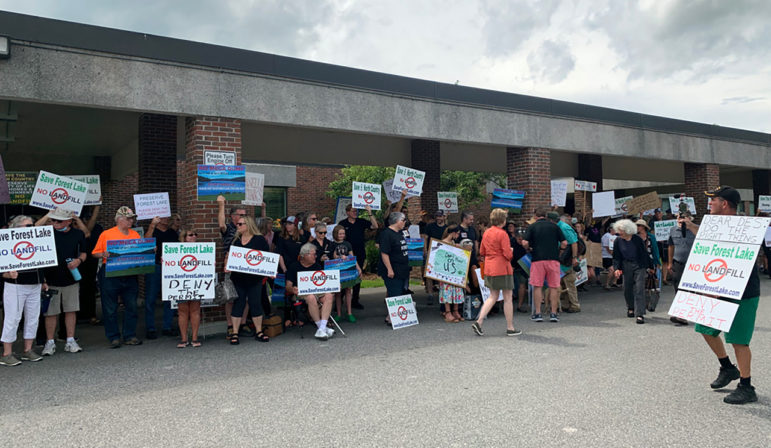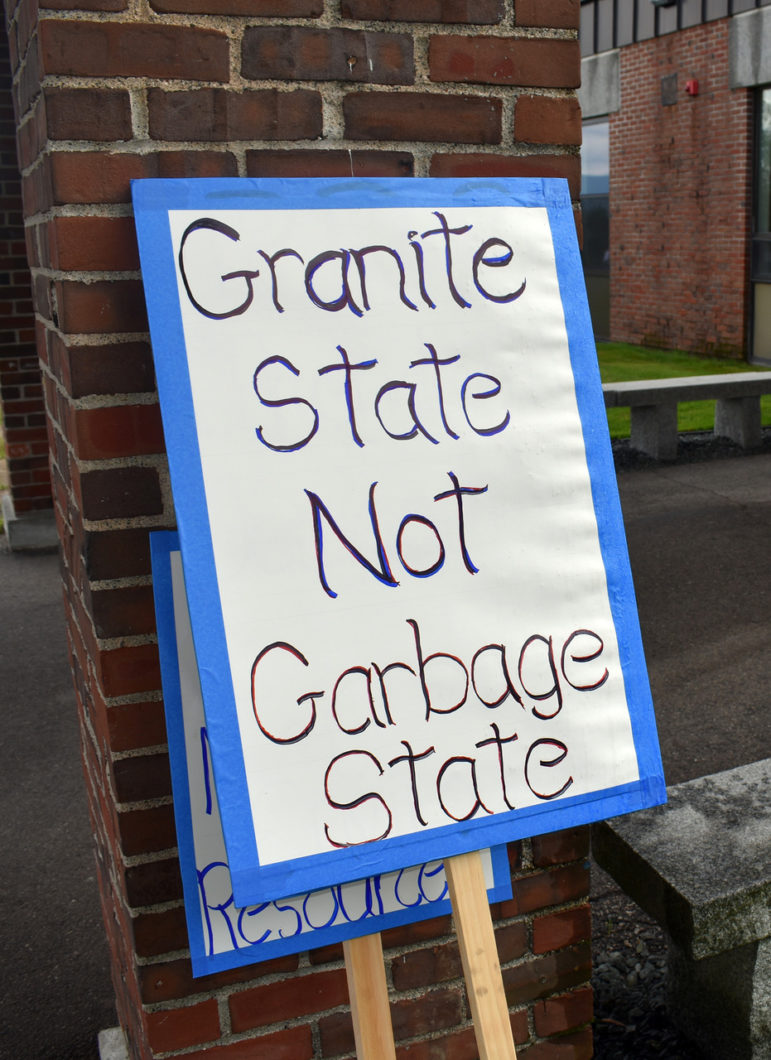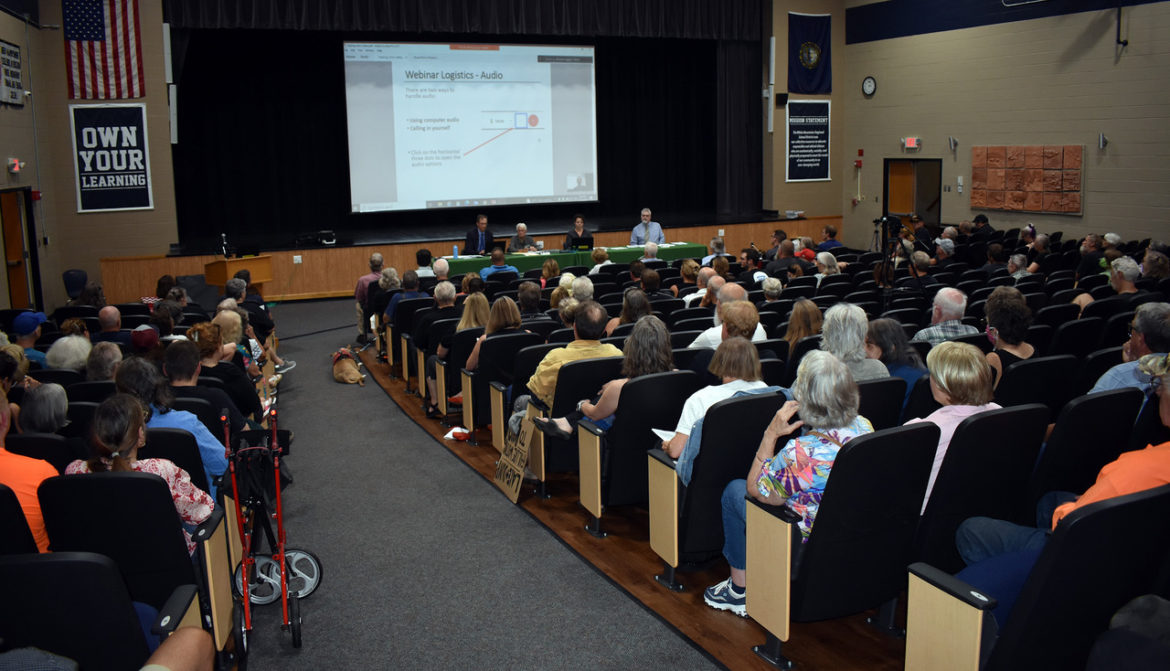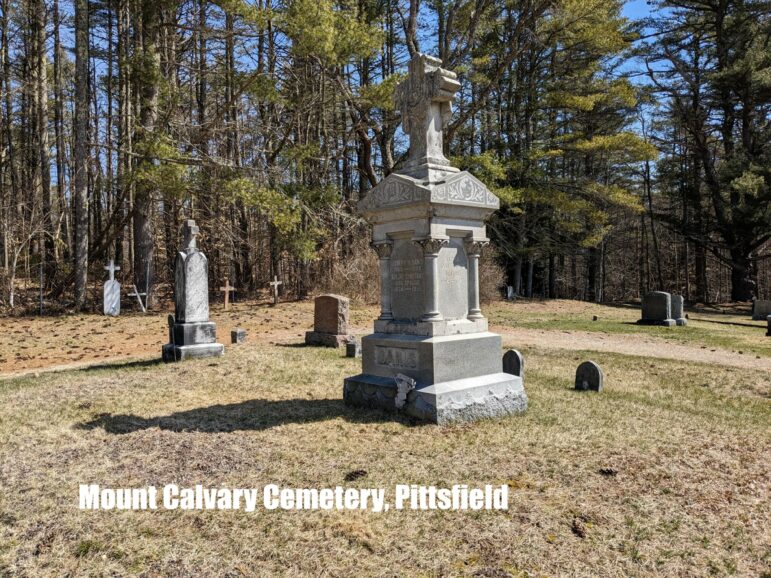
By THOMAS P. CALDWELL, InDepthNH.org
WHITEFIELD — Members of the New Hampshire Department of Environmental Services’ Wetlands Bureau heard nearly six hours of testimony from citizens on Monday, with the majority of the speakers registering opposition to a proposed landfill in the adjacent town of Dalton.
With chants of “Do the right thing — deny!” protesters from Whitefield, Dalton, Bethlehem, and Littleton, as well as more distant locations, gathered outside White Mountains Regional High School ahead of the hearing to emphasize their opinion that a landfill near a state park and pristine lake is the worst of options.
“We’re hoping that the fact that we’ve got such a large crowd out here during the middle of the day during the week can help show the New Hampshire DES Wetlands Bureau that this is simply a project that we don’t want in the North Country,” said Jon Swan, the founder of Save Forest Lake. “It’s not only the impact to the wetlands, but the significant far-reaching impacts throughout the North Country — a second landfill on the Ammonoosuc River upstream, the heavy truck traffic that’s going to be routed through Whitefield, not to mention that you’re going to have an operating landfill 2,800 feet from the water’s edge of Forest Lake State Park.”
Swan added, “If you get a chance to talk to Governor Sununu, shame on him for not having an interest in coming up and talking to these concerned property owners. I approached him at the Executive Council a couple weeks ago and he basically told us to go pound sand, so shame on him.”
Tom Tower of the North Country Alliance For Balanced Change, a group formed in 2013 to focus on the North Country watershed, said he hoped to get the DES to recognize that “this is an outrageous proposal.”
“We’re going to ask them, both with a combination of science and public outrage, to say, ‘Deny this permit; it just doesn’t make any sense to put a landfill in this area, next to a state park, next to wetlands and this river.’ There are many more towns that actually use the river not only for enjoyment or recreation, but to actually drink it. So it just makes absolutely no sense in this location,” Tower said.
The application from Vermont-based Casella Waste Systems, Inc., doing business as Granite State Landfill, LLC, states that the project would impact about 17 acres of wetlands off Douglas Drive near the Dalton/Bethlehem border. During the company’s presentation, engineer Joe Day said they settled on Dalton after a statewide search beginning in 2017, avoiding existing host communities and airports, as well as sites that would cross municipal borders. The finalists included two locations in Carroll (Twin Mountain), one in Shelburne, and the one in Dalton.
Day said the company delineated the wetlands and did hydrogeological studies in 2018 and spent 2019 and part of 2020 making four revisions to minimize the landfill’s impacts. The wetlands board application was filed on August 30, 2020.
He said there have been five office or virtual meetings with the DES and four on-site meetings, as well as meetings in Massachusetts with the United State Environmental Protection Agency and the U.S. Army Corps of Engineers. They also met twice with the Dalton Board of Selectmen.
The Need
The Department of Environmental Services predicts that, in the next 10 years, New Hampshire will lack solid waste disposal capacity of between 20,000 and 120,000 tons per year, and that shortfall could reach 1.35 million tons per year starting in 2034, as existing landfills reach capacity.
While recycling can help to reduce the amount of solid waste going into landfills, the market for recyclables disappeared after China stopped accepting it because much of it was contaminated. Single-stream recycling had allowed people to send mixed batches of recyclable material that then is separated at a central site. The problem is that as much as 90 percent of those recyclables became contaminated.
Today, more communities are looking at separating the various recyclable materials, but doing so requires more space and specialized bailing equipment, and only metals and cardboard produce much revenue. There is no market for plastics, and little for glass.
As a result, landfills offer the only immediate solution. Yet siting them in an appropriate location is not easy, and there is the likelihood of contamination. The Coakley Landfill in North Hampton leaked PFAS (polyfluoroalkyl substances, which can lead to liver damage, thyroid disease, decreased fertility, high cholesterol, obesity, hormone suppression, and cancer) into the local water supply.
The New Hampshire House passed a bill in April that would protect state parks in towns without zoning laws, such as Dalton, but the Senate rejected the bill, arguing that it should be local decision.
Swan weighed in on that argument: “I’ll tell you the irony of that,” he said. “The town of Dalton twice now has passed zoning to try and stop this project, and Casella has told Dalton they have no interest or a recognition of our local zoning, yet they tout local authority over House Bill 177, which the Senate and Governor Sununu helped sabotage. So the ironies abound with this project, and we’re certainly finding a nice long list of villains that we’ll recognize if this ultimately gets permitted and put in place, because the North Country will never be the same.”
Chief among those “villains” to opponents is Casella itself, which speakers at the hearing repeatedly cited for infractions and fines. Just last May, the company was responsible for the state’s largest spill of leachate when as much as 154,000 gallons of the contaminated liquid runoff overflowed a holding tank and detention pond. The state is still investigating the spill, which occurred over the weekend when no one was on-site to notice it.

Save North Country
While the plans call for utilizing only 137 acres of the 1,900-acre parcel of land, residents questioned whether it would be limited to the three phases outlined in the application. They noted that Casella routinely asks for expansions after it completes the work outlined in its initial permit. Casella also was said to have amassed $9.25 million in fines in the states where it operates.
During Day’s presentation, he said the topography shows that there is a ridge between the landfill and the water, but his blanket statement that there would be no contamination of Forest Lake was met with laughter around the room. Speakers also called him out for saying the Dalton Conservation Commission had visited the site. In fact, Casella had refused to allow members of the Conservation Commission onto the property, according to Dalton officials.
Eric Thompson of Dalton questioned the accuracy and quality of the studies Casella had done and said the necessary bedrock hydrological studies “seem to be missing.”
“What happened in Massachusetts, Vermont, New York, and Bethlehem are red flags,” he said.
Lorraine Carter of Dalton quoted from the Environmental Protection Agency: “No liner can keep all liquids out of the ground for all time. Eventually, liners will either degrade, tear, or crack.”
The project will involve the cutting of forests and disturbance of wetlands and vernal pools, features that are essential to wildlife, including endangered species, several speakers noted.
Brian Campolo of Dalton commented, “Coos County is the poorest region in New Hampshire, and its only intrinsic asset is its spectacular, pristine environment that powers the tourism industry. In light of that, how could it be possible to propose to locate it in proximity to one of the county’s state parks? There is a long-term risk of environmental damage from the dump.”
Speakers repeatedly quoted the DES’ mission statement as proof that it should reject the application, and some urged the board to go further and revise its rules governing such projects.
Watching and commenting remotely, Jackie Elliott of Waterboro, Maine, describing herself as an environmental health and justice advocate who has dealt with Casella in both Maine and New Hampshire, summed up the comments by saying, “This is an important opportunity that you have to stop and reconsider. It would appear that Casella has failed to meet the required permit obligations, relative to these wetlands. So you can stop here. And you can use this opportunity to start thinking of waste management on the front end. …
“We are going to run out of places to send our waste, so this is the time for the DES to be true to its mission and to its statutory requirement to examine their waste management strategies and begin implementing those policies that deal with waste on the front end, rather than continuing to focus on the end solutions which are not sustainable.”





